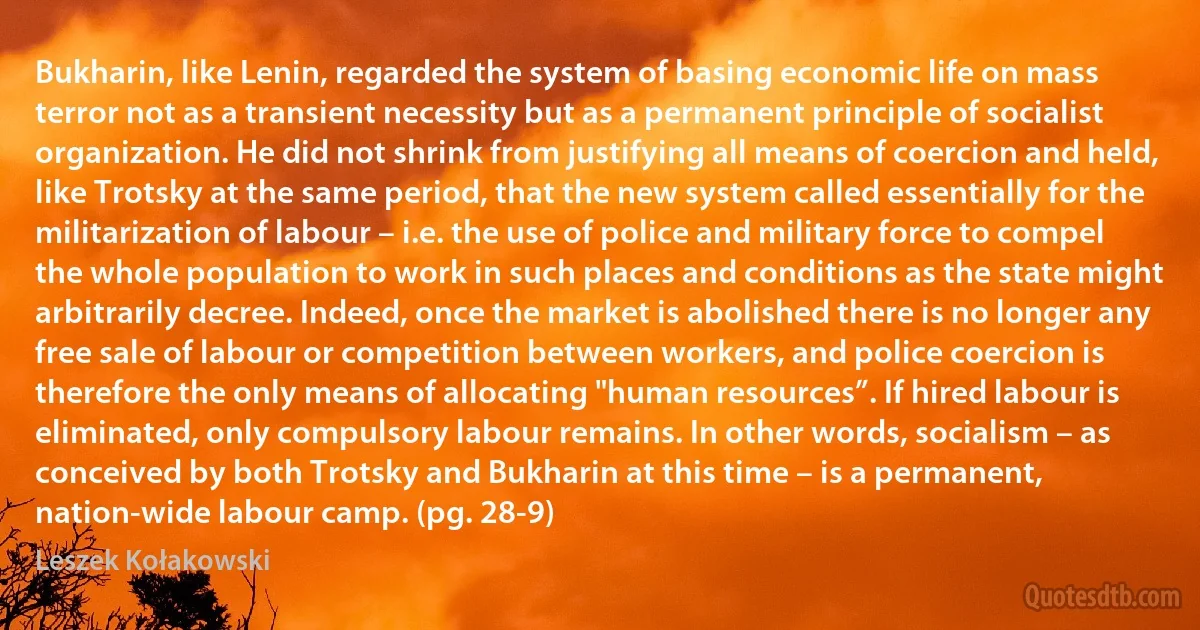
Bukharin, like Lenin, regarded the system of basing economic life on mass terror not as a transient necessity but as a permanent principle of socialist organization. He did not shrink from justifying all means of coercion and held, like Trotsky at the same period, that the new system called essentially for the militarization of labour – i.e. the use of police and military force to compel the whole population to work in such places and conditions as the state might arbitrarily decree. Indeed, once the market is abolished there is no longer any free sale of labour or competition between workers, and police coercion is therefore the only means of allocating "human resources”. If hired labour is eliminated, only compulsory labour remains. In other words, socialism – as conceived by both Trotsky and Bukharin at this time – is a permanent, nation-wide labour camp. (pg. 28-9)
Leszek KołakowskiRelated topics
basing coercion decree force free hold human life longer market mass might necessity once organization sale socialist state time use work remains means words militarization labour LeninRelated quotes
Microeconomics, including the study of individual choice and of group choice in market and nonmarket processes, has generally been considered a field science as distinct from an experimental science. Hence microeconomics has sometimes been classified as "non-experimental" and closer methodologically to meteorology and astronomy than to physics and experimental psychology (Marschak, 1950, p. 3; Samuelson, 1973, p. 7). But the question of using experimental or nonexperimental techniques is largely a matter of cost, and generally the cost of conducting the most ambitious and informative experiments in astronomy, meteorology, and economics varies from prohibitive down to considerable. The cost of experimenting with different solar system planetary arrangements, different atmospheric conditions, and different national unemployment rates, each under suitable controls, must be regarded as prohibitive.

Vernon L. Smith
I soon came to know in the weary debates and the 104 divisions against the European Communities Bill who it was with whom I shared feelings of anger, outrage and hatred at what was being perpetrated. I am aware that the "Left" is supposed to be motivated only by the desire to be unimpeded by "Europe" in converting Britain into a socialist state; but I am compelled to depose that the instincts and reasoning of the "Left" opponents of membership...were exactly as nationalistic, not to say patriotic, as my own...[I part company with Labour only] because of my blind, high Tory ultimate faith in the people. If they are the people I thought and still want to think that they are, those who represent them will assuredly be pulled back in time from the betrayal of their birthright of parliamentary freedom either to a European state or to a Marxist bureaucracy.

Enoch Powell
What is the alternative to collective bargaining? There is none except anarchy, and there are rare elements in the country that would like to see anarchy in the trade unions-in my view the most dangerous thing for the country that could happen. Another alternative is force, but we may rule out force in this country, and I would lay it down that, so long as the industrial system remains as it is, collective bargaining is the right thing. I have no doubt about that. And yet we all know in our heart of hearts that it may be a clumsy method of settling disputes, and that the last word has not been spoken. Some day, when we are all fit for a democracy, we shall not need these aids, but certainly for my part, and as long as I can see ahead, unless there is that change in human nature which we are always hoping for, collective bargaining will be a necessity.

Stanley Baldwin
A final aspect of all open access orders is Schumpeter's notion of creative destruction, one of the most powerful descriptions of a competitive, open access economy. When Schumpeter wrote Capitalism, Socialism, and Democracy in the early 1940s, the economic theory of perfect competition among atomistic firms (i. e., firms too small to have market power) had come under sustained attack as unrealistic. Large and powerful economic organizations dominated the new economy, and their behavior did not match the textbooks. Despite this dominance, the economy produced historically unprecedented, sustained economic development. Schumpeter asked, How could large businesses that were supposed to choke off competition and growth nonetheless generate such spectacular productivity increases in a world that seemed ever more competitive?

Douglass North
My broad position remains firmly libertarian, sceptical of official cover-ups and uncompromisingly internationalist, believing sovereignty to be an almost total illusion in the modern world, although both expecting and welcoming the continuance of strong differences in national traditions and behaviour. I distrust the deification of the enterprise culture. I think there are more limitations to the wisdom of the market than were dreamt of in Mrs Thatcher's philosophy. I believe that levels of taxation on the prosperous, having been too high for many years (including my own period at the Treasury), are now too low for the provision of decent public services. And I think the privatisation of near monopolies is about as irrelevant as (and sometimes worse than) were the Labour Party's proposals for further nationalisation in the 1970s and early 1980s.

Roy Jenkins
